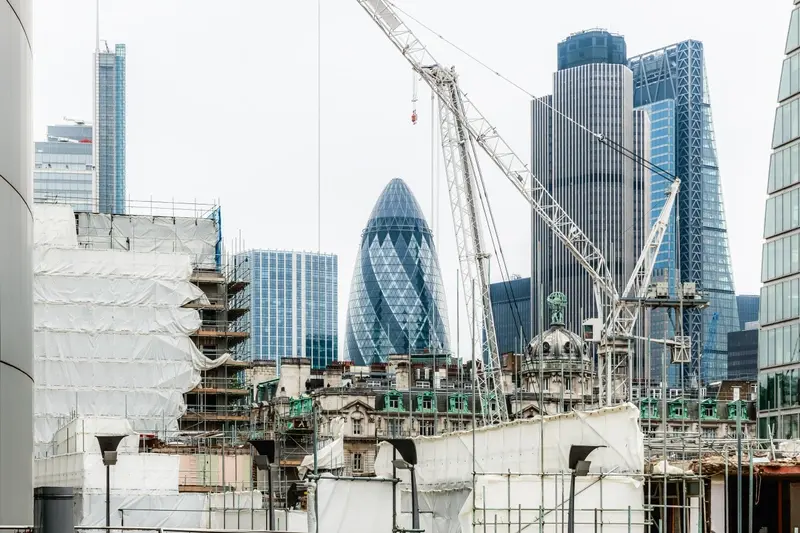
Stock prices in London were lower at midday ahead of US jobs data, but alongside news that the UK construction sector is recovering from a ‘difficult start’ to the year.
The FTSE 100 index was down 16.37 points, or 0.2%, at 8,253.23. The FTSE 250 was up 53.03 points, or 0.3%, at 20,861.64, and the AIM All-Share was up 1.09 points, or 0.1%, at 760.75.
The Cboe UK 100 was down 0.1% at 825.66, the Cboe UK 250 was up 0.5% at 18,385.06, and the Cboe Small Companies was up 0.2% at 16,920.53.
UK construction companies enjoyed a sustained rebound in activity in August, according to data from S&P Global on Thursday, though the pace of this recovery moderated from July.
The headline construction purchasing managers’ index registered 53.6 in August, lower than 55.3 in July, and FXStreet-cited consensus of 54.9.
Commercial activity was the best-performing segment, despite the pace of growth slipping. A number of firms noted a boost from rising sales enquiries and the release of new orders following the general election. Civil engineering activity meanwhile expanded at only a moderate pace that was notably weaker than in July.
‘The UK construction sector appears to have turned a corner after a difficult start to 2024, with renewed vigour in the house building segment the most notable development in August. Residential work expanded at the fastest pace for almost two years as lower borrowing costs and a gradual recovery in market conditions helped to boost activity,’ said Tim Moore, economics director at S&P Global Market Intelligence.
In European equities on Thursday, the CAC 40 in Paris was down 0.6%, while the DAX 40 in Frankfurt was up 0.1%.
Retail sales in the eurozone edged lower against expectations in July, data published by Eurostat showed Thursday.
Retail sales declined by 0.1% on a calendar-adjusted basis in July compared to a year ago. This is slowed from a contraction of 0.4% in June, but the FXStreet-cited consensus had pencilled in an uptick of 0.1% for July.
Notably, the volume of retail sales picked up by 0.2% for non-food products except automotive fuel year-on-year in July, while it fell by 0.7% for food, drinks and tobacco.
The pound was quoted at $1.3164 at midday on Thursday in London, higher compared to $1.3147 at the equities close on Wednesday. The euro stood at $1.1098, up against $1.1079. Against the yen, the dollar was trading at JP¥143.51, down compared to JP¥144.24.
In London, Burberry gained 3.1% after getting relegated from the FTSE 100 index.
Replacing it will be Hiscox, the Anglo-Bermudan insurance provider, which has seen its share price rise 14% in the year to date, taking its market value above £4 billion. In contrast, Burberry’s share price has plunged 55% following a number of disappointing trading updates.
Elsewhere on the FTSE 100, Associated British Foods lost 5.1%.
The group said that it has continued to ‘perform well’ in the second half, though the British weather dampened Primark’s prospects, with like‐for‐like sales expected to decrease by around 0.5% in the second half. Total revenue growth for Primark is expected to be around 4%.
For the Sugar unit, AB Foods described a ‘mixed’ performance, due to a sharp fall in European sugar prices.
The Sugar unit is now expected to deliver annual adjusted operating profit for financial 2024 of £200 million. However, operating profit for the overall segment is now expected to be in the range of £50 million to £75 million in financial 2025.
In the FTSE 250, Bakkavor gained 6.2%.
The food manufacturing company reported interim pretax profit of £45.2 million, up from £32.6 million a year prior, while revenue came to £1.12 billion, up 2.8% from £1.09 billion.
The firm declared an interim dividend of 3.20 pence per share, up 10% from 2.91p the year previously. It also upgraded its outlook, raising expectations for annual adjusted operating profit to between £108 million and £112 million.
Separately, Bakkavor also announced that Chief Financial Officer & Asia CEO Ben Waldron is due to step down on October 31, though he will stay at the company until the end of April. Replacing him is UK Finance Director Lee Miley, who will become CFO effective November 1.
Elsewhere, Asos jumped 20%.
The retailer said it has agreed a joint venture with Heartland for both the Topshop and Topman brands. Accordingly, Heartland will own 75% of Topshop and Topman, while Asos will retain 25% and receive £135 million in cash.
On AIM, Xeros Technology Group plummeted 40%.
The Rotherham, England-based laundry technology firm bemoaned several developmental delays, which are expected to impact annual expectations.
Its Indian domestic laundry licensee, IFB Industries Ltd, has changed the specification of the 9 kilogram washing machine it was testing, meaning that mass market launch is now expected in 2025.
Further, while microfibre filtration legislation is now in place in France, the standards pertaining to it remain unclarified. As a result, this is not expected to drive demand for the group’s XF3 technology in the short term.
Accordingly, Xeros downgraded its revenue expectations for financial 2024 and financial 2025 to £500,000 and £3.8 million respectively, and adjusted loss before interest, tax, depreciation and amortisation to £4.2 million and £1.0 million.
Stocks in New York were called predominantly higher. The Dow Jones Industrial Average and the S&P 500 index were both called up 0.1%, while the Nasdaq Composite was called down 0.1%.
In politics, Kamala Harris and Donald Trump returned to the US campaign trail Wednesday, with new polls showing the White House race remains on a knife-edge less than a week before their crucial first debate.
The match-up comes after the Federal Reserve’s Beige Book showed that more regions in the US reported flat or declining economic activity in recent weeks.
‘Economic activity grew slightly in three Districts, while the number of Districts that reported flat or declining activity rose from five in the prior period to nine in the current period,’ the Beige Book said.
Five Districts saw slight or modest increases in overall headcounts, but a few Districts reported that firms reduced shifts and hours. Wage growth was modest, while increases in non-labour input costs and selling prices ranged from slight to moderate.
Brent oil was quoted at $73.15 a barrel at midday in London on Thursday, down from $73.28 late Wednesday.
‘Oil bears didn’t wait Friday’s data to send the barrel of US crude below the $70 per barrel level. The rising fear of US slowdown, on top of the Chinese worries, accelerated the early week selloff.
‘As a response to the recent meltdown in oil prices, and the potential of a deeper dive in case of worsening data, OPEC+ delegates said yesterday that they are considering a possible delay to their plan to increase supply by 180,000 from October. Surprise, surprise,’ said Swissquote Bank’s Ipek Ozkardeskaya.
She added: ‘But even if OPEC+ plays it safe, their decision to extend the production cuts to the year end may not suffice to cheer up the oil bulls – increasingly worried about waning demand prospects on deteriorating global macro setup.
‘Pricewise, this means that better-than-expected jobs figures from the US could bring dipbuyers in, carry and keep the barrel of US crude above the $70pb but another disappointment will likely accelerate the selloff and build a resistance near this level, no matter what OPEC+ decides to do.’
Gold was quoted higher at $2,514.30 an ounce against $2,495.10.
Still to come on Thursday’s economic calendar there is a handful of data from the US, including composite PMI, ISM services PMI, and initial jobless claims.
Copyright 2024 Alliance News Ltd. All Rights Reserved.




